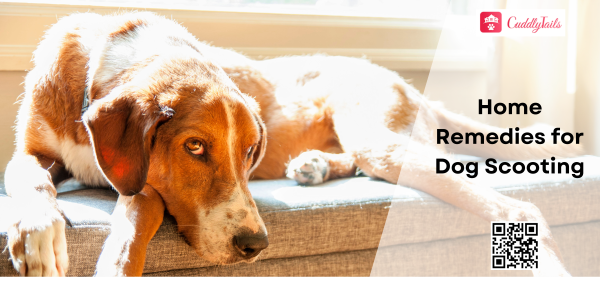Home Remedies for Dog Scooting
Dog scooting is a common behavior that pet owners may observe in their furry companions, often sparking curiosity and concern. Understanding the reasons behind this seemingly peculiar action is essential for maintaining the health and well-being of our dogs. From impacted anal glands to skin irritations, various factors can contribute to dog scooting.
Understanding Dog Scooting
What is Dog Scooting?
Dog scooting refers to the act of a dog dragging its bottom along the ground, often in an attempt to relieve discomfort or itchiness. This behavior is more than just a quirky action—it’s a signal that something is bothering your dog. Commonly, it’s associated with irritation in the anal area, but other causes may also play a role.
Normal Dog Behavior vs. Abnormal Scooting
While the occasional scoot can be normal (dogs have their quirky moments, too!), frequent or excessive scooting could signal a problem that needs attention.
Causes of Dog Scooting
Impacted Glands
One common cause of dog scooting is anal gland issues. These small sacs located on either side of the anus can become impacted or infected, leading to discomfort and the urge to scoot.
Parasites or Infections
Parasites like worms or infections in the anal area can also lead to scooting behavior. It’s important to address these issues promptly to relieve your pup’s discomfort.
Allergies or Skin Irritations
Allergies or skin irritations, such as flea bites or contact dermatitis, might cause your dog to scoot in an attempt to alleviate itching and discomfort.
Home Remedies for Dog Scooting
Warm Water Soaks
Give your dog soothing warm water soaks to help clean and relieve irritation in the affected area. Just like a spa day for your furry friend!
Apple Cider Vinegar Rinse
A diluted apple cider vinegar rinse can help restore balance to the skin and provide relief from itching.
Coconut Oil Application
Coconut oil is a natural moisturizer and has antibacterial properties that can help soothe irritated skin.
Dietary Changes to Help with Dog Scooting
High-Fiber Diet
Adding more fiber to your dog’s diet can promote healthy digestion and firm up their stools, potentially reducing the need for excessive scooting.
Probiotics and Digestive Enzymes
Probiotics and digestive enzymes can support your dog’s gut health, aiding in proper digestion and potentially alleviating the digestive issues that lead to scooting.
Hygiene Practices for Preventing Dog Scooting
Regular Gland Expression
Your dog’s anal glands need regular emptying. If your pooch is scooting more than you at a dance party, it might be time for a vet visit.
Cleanliness and Grooming
No one likes a dirty booty, not even your dog. Regular baths and keeping the back area clean can prevent scooting shenanigans.
When to Seek Veterinary Care for Dog Scooting
Scooting can sometimes be more than just a quirky habit. Here’s when to put the brakes on DIY remedies and head to the vet:
Persistent Scooting or Discomfort
If your pup’s scooting routine seems more like a marathon than a quick scratch, it’s time to get them checked out. Discomfort shouldn’t be their daily workout routine.
Underlying Health Conditions
Scooting could be a signal of something more serious. From infections to parasites, your vet can help sniff out the root cause.
Tips for Preventing Recurrence of Dog Scooting
Maintaining a Healthy Diet
Just like you after a cheat day, a balanced diet keeps everything running smoothly for your furry friend.
Regular Veterinary Check-ups
Prevention is key. Regular check-ups can help catch any scooting surprises before they become a full-blown saga.
Conclusion
In conclusion, being proactive in addressing dog scooting through a combination of home remedies, dietary modifications, and proper hygiene practices can significantly improve the quality of life for our beloved pets. By staying attuned to their needs, seeking timely veterinary care when necessary, and maintaining a preventive approach, pet owners can minimize the discomfort associated with scooting and promote overall wellness for their canine companions. With a well-rounded understanding of dog scooting and a commitment to their care, we can ensure that our dogs thrive and enjoy a healthy, scoot-free existence.
FAQs
What is the most common cause of dog scooting?
The most common cause is anal gland irritation or impaction. Other reasons include parasites, skin allergies, or digestive issues.
Can diet alone resolve dog scooting issues?
In many cases, a high-fiber diet can improve digestive health and prevent anal gland problems, but persistent scooting may require additional interventions.
Is it safe to express anal glands at home?
It can be safe if done carefully and under guidance, but improper technique can hurt your dog. When in doubt, seek professional help.
How do I know if scooting is a serious issue?
Frequent scooting, signs of pain, or discharge from the anal area indicate that you should consult a vet immediately.
Are there any risks to using home remedies?
Most remedies are safe when used appropriately. However, misdiagnosing the cause of scooting or using unsafe products can harm your dog. Always consult your vet for severe or persistent cases.

